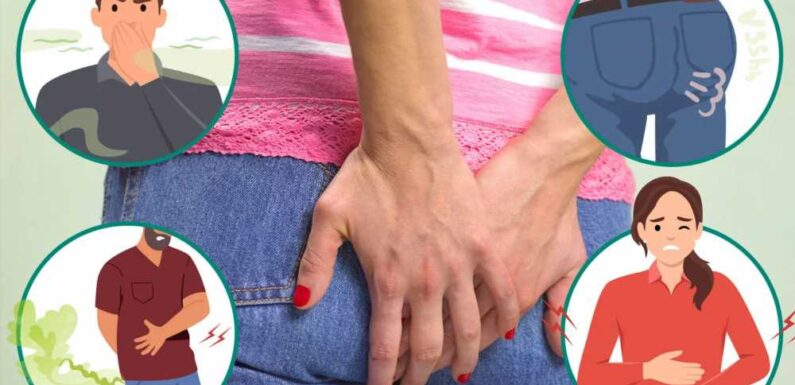
YOU might do your best to hide it throughout the day, but let's face it – we all fart.
Believe it or not, there isn't just one type of toot.
The smell, frequency and even the temperature of your farts can vary based on your diet and digestion.
And as the festive season approaches, the treats and larger meals you indulge in might also lead your gut health to play up.
According to Dr Philip Mayhead – consultant gastroenterologist at Benenden Hospital that's part of Benenden Health – there are five common types of farts.
And each can tell you something about your overall health.
Read more on farts

What the smell of your farts says about your health – and when you should worry

Five surprising foods that make your farts stink – and signs to watch out for
Before we get into the nitty gritty, you might wonder what a fart actually is.
Flatulence is gas that has made its way through our gastrointestinal system and is released through the rectum, Dr Mayhead explained.
"The causes do vary, but it is often related to digestion, or swallowing
air while eating or drinking," he said.
According to the gastroenterologist, here's what they mean.
Most read in Health

I tested 9 cold remedies – the winner left me ‘healthy’ again in 20 minutes

I’m a female bodybuilder after losing SIXTEEN stone… but now I can’t walk

Lidl urgently recalls ‘unsafe to eat’ chocolate bars over plastic fears

Eating too many ready meals ‘could raise risk of 3 cancers by almost 25%’
1. Foul-smelling farts
Ever tried to secretly let a toot out, only to be hit by the whiff of rotting eggs?
Dr Mayhead said farts that are foul-smelling or have a rotten egg aroma are usually a result of "sulphur-containing compounds produced during digestion".
If your eyes water whenever you let one out, it might be a sign you need to lay off certain foods.
The gastroenterologist pointed out certain high-sulphur foods that are popular around Christmastime, including cauliflower, broccoli, cabbage and Brussels sprouts.
Bacterial colonies in you gut could also be to blame.
"Sometimes, when your farts are really foul-smelling, it is the result of
intestinal bacterial colonies producing gases like carbon dioxide, hydrogen and methane," Dr Mayhead added.
2. Odourless farts
If, on the other hand, your toots have no smell, it's probably a sign that you're swallowing air while eating or drinking, Dr Mayhead said.
Odourless farts usually consist of nitrogen, oxygen, carbon dioxide, and small amounts of other gases, he explained, adding that this is "the most common type of fart".
3. Excessive flatulence or bloating-related farts
Dr Mayhead said: "If you experience frequent, excessive flatulence, it can feel like you need to open your bowels more frequently or have the urgency to go to the toilet."
Your discomfort could have a few root causes.
It might be because you're eating gas-producing foods.
But excessive farting and bloating can also be a sign that you have irritable bowel syndrome (IBS).
This is common condition affecting the digestive system that causes symptoms like stomach cramps, bloating, diarrhoea and constipation,which come and go over time.
Lactose intolerance – when you can't break down enzymes found in dairy – could also be the cause of your woes.
"For individuals with lactose intolerance, the festive season may bring an additional challenge, as indulging in treats like chocolate can lead to uncomfortable symptoms. Just be mindful," Dr Mayhead said.
4. Hot farts
According to Dr Mayhead, farts that feel hot when you pass them can be caused by spicy foods.
"This type of gas occurs as a result of eating foods that are high in capsaicin, such as chillies or spices," he explained.
"It might be best to avoid [ingredients] that bring the heat – literally."
5. Normal farts
As we've noted, farts are totally normal and it's not usually something to be worried about if you're letting them out during the day.
"In small quantities, this type of gas is perfectly normal and is just a natural byproduct of digestion," Dr Mayhead explained.
"When you eat, you swallow air, and your gut bacteria produce gases as they break down food – simple as that."
How does my diet impact my toots?
Dr Mayhead said: "Your diet and the bacteria in your colon have a huge impact on how much gas you produce.
"Eating a balanced, varied diet is important – not just for your waistline, but also for your gut health in reducing the likelihood of excessive flatulence.
"It may not be easy during the festive period, but if you have specific dietary sensitivities or intolerances, such as lactose intolerance, it’s all the more important to adapt your diet and seek guidance from a healthcare professional."
Not eating a variety of foods and sticking to the same kinds of meals daily and weekly could also make you more farty.
As Dr Mayhead put it: "A lack of variety in your diet can lead to low bacterial diversity in the gut and cause excessive flatulence.
"The same thing can happen as a result of small intestinal bacterial overgrowth (SIBO), which can lead to nutrient absorption issues and possible digestive symptoms like excessive gas.
"If you suspect these underlying factors, do consult a medical professional."
When should I be concerned?
"Farting is as natural as breathing," Dr Mayhead stated.
But there are certain things that are worth bring up with a GP.
See a GP if you're experiencing the following symptoms along with flatulence:
- Blood in your poo
- Unexplained weight loss
- Severe pain in your tummy (abdomen)
- A lump in your tummy
These could all be a sign of bowel cancer.
Source: Read Full Article
